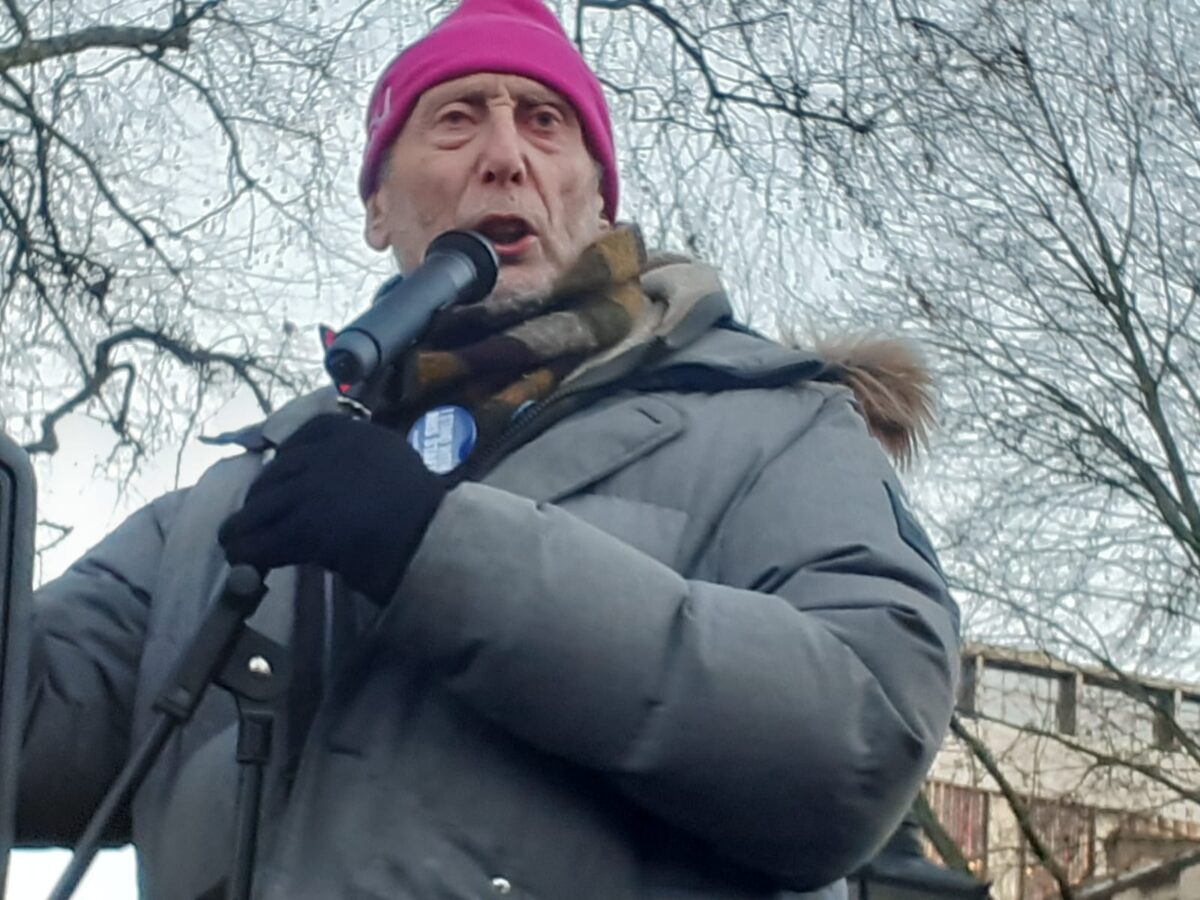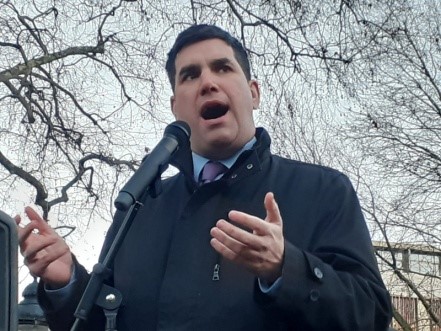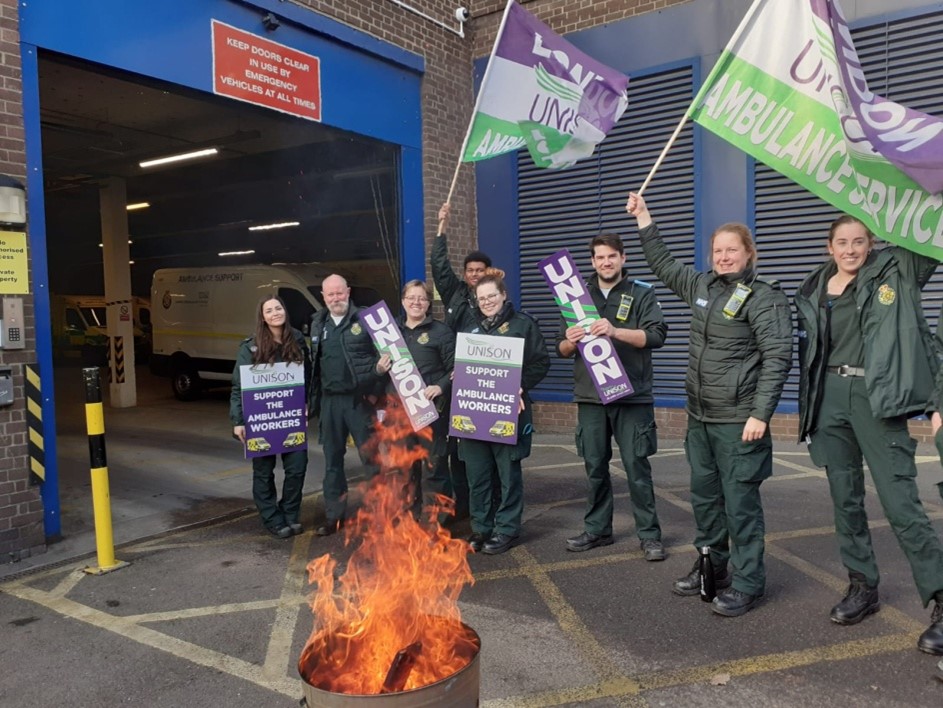The level of public support for NHS workers was evident to every one of the thousands of activists who marched through central London from University College Hospital (UCLH) to Downing Street on Wednesday, 18 January. Hoots of support from bus drivers, many of whom have themselves been involved in strike action demanding fair pay, are not unusual, but I’ve never seen so many passengers on said buses clapping and cheering as we snaked through the streets.
This was uplifting for me and the seasoned activists I was marching with. More importantly, I assume that many of the RCN members from the lively picket at UCLH had never been on a demonstration before. A boost to the morale of people taking strike action for the first time and struggling every work day with the absolute crisis in the NHS is much more important than the impact on long-term campaigners. “We are the NHS” was one of the most persistent chants from health workers.
“We are the NHS”
chant from health workers
The Tories have tried to convince everyone that the situation facing the NHS—they consciously avoid using the word “crisis”—is a result of the impact of COVID and the current strike wave. Given the fact that for most of the last 3 years they have been determinedly downplaying the impact of the pandemic, this is cynical beyond belief.
Instead, as John Lister explains, this crisis was years in the making because of the political choices made by the Tories. He talks about how systematic underinvestment in health services since 2010 led to the fact that “In November, 37,837 patients waited more than twelve hours on trolleys in A&E, a thirty-four-fold increase from 1,111 patients before the pandemic in November 2019—even though the number of emergency admissions was almost 8% lower than in November 2019.” England’s waiting list almost doubled from 2.5 million in 2010 to 4.6 million at the end of 2019 and subsequently rose to 7.2 million. This, along with an increase in the number of unfilled jobs as tired and underpaid workers leave in despair, is in addition to the creeping privatisation that NHS campaigners have been warning about for more than a decade. This is the catalyst for this year’s winter crisis, which is deeper than anything any of us have ever seen.
The Tories have tried to convince everyone that the situation facing the NHS—they consciously avoid using the word “crisis”—is a result of the impact of COVID and the current strike wave. Given the fact that for most of the last 3 years they have been determinedly downplaying the impact of the pandemic, this is cynical beyond belief.
The spirit of determination from the picket line continued once we reached our destination at the rally, despite the absolutely biting cold. The event was led by Dr. Alia Butt, and NHS workers, left-leaning (Labour) MPs, and other activists spoke to the crowd in between.

Author and activist Michael Rosen also made a powerful contribution about his recovery from COVID, supported by so many different healthcare professionals. But probably the most important speech came from Leeds East MP Richard Burgon, who not only outlined in graphic terms the way underfunding, privatisation, and contempt for staff have brought the health service to the parlous state it is today, but also the necessity of building a huge march, comparable to those against the Iraq war, in defence of our NHS. Richard’s words, greeted with the strongest applause of the event, took place before the announcement for that protest, which is now fixed; Saturday, 11 March, should be in everyone’s diary.


It was very upsetting that, not long after this, a serious disruption of the rally was caused by an anti-vaccine protester who had set up a permanent booth right across from Downing Street. I noticed the booth and its deeply reactionary slogans a few days earlier during the right to strike protest, but on that occasion he did not attempt to interrupt the proceedings. Perhaps there is more than a hint of misogyny in demanding that nurses go back to work but not firefighters… He started just shouting at those near him but then started using a microphone, so that Beth Winter MP really had to compete with him. One wonders when the mayor of London, Sadiq Khan, will do what his predecessor, Boris Johnson, did to peace campaigner Brian Haw and get a possession order to have this public nuisance removed.
But despite this diversion and the cold seeping into my bones, I came away still elated by the sense of solidarity from the protest. This warm glow followed me on Monday, January 23, as I joined the ambulance workers’ picket line at Islington ambulance station, though I was still glad of the warmth from the brazier. This was my second visit to this picket line, bringing solidarity both from my union branch, Hackney and Islington Unite Community, and from the Islington North Labour Party. On this occasion, I really got a chance to chat with a number of the strikers and was impressed by their determination and cheerfulness.

My third NHS-related commitment in 10 days will be on Saturday 28 January, when I will be running one of four stalls across the borough for the Islington Keep Our NHS Public campaign (9KONP0). This is our local contribution to KONP and SOS NHS’s national day of action; there are events all over Britain, and you can check out what is going on in your locality here. As well as giving out leaflets, we will also be asking people to write a message to Rishi Sunak about their wishes for the NHS, write it on a piece of paper, and then have their photo taken with it.
Art Book Review Books Campism Capitalism China Climate Emergency Conservative Government Conservative Party COVID-19 Creeping Fascism Economics EcoSocialism Elections Europe Far-Right Fascism Film Film Review Fourth International France Gaza History Imperialism Israel Italy Keir Starmer Labour Party Long Read Marxism Marxist Theory Migrants Palestine pandemic Police Protest Russia Solidarity Statement Trade Unionism Trans*Mission Transgender Ukraine United States of America War

